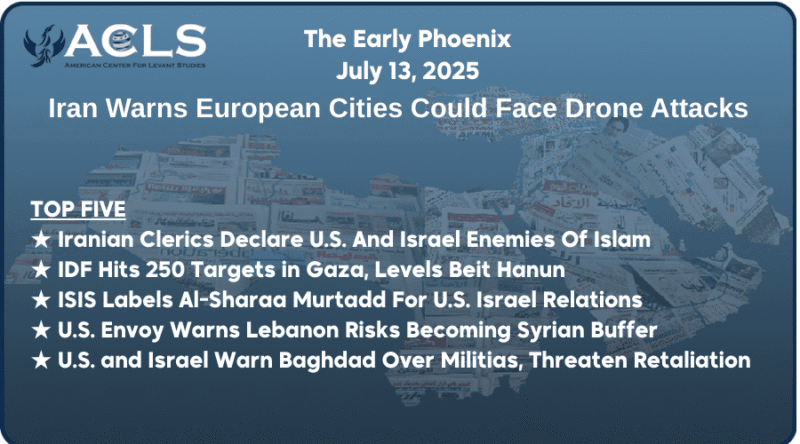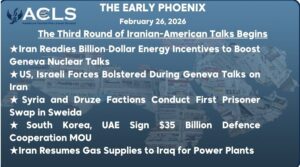
Distributed: July 13, 2025| 6:00 AM EST
IRAN
-
Iran Warns European Cities Could Face Drone Attacks
Former Iranian official Mohammad Javad Larijani warned that five drones could strike a European city soon, declaring Europe unsafe after Israel’s June attacks. He also threatened Trump directly, suggesting a drone could strike him at Mar-a-Lago. The warning follows Iran’s expulsion of IAEA inspectors, accused of aiding Israeli-U.S. strikes.
-
U.S. Arrests Iranian Resident For Illegally Exporting Tech To Iran
Bahram Ostovari, a U.S. permanent resident and Tehran-based CEO, was arrested July 11 in Los Angeles for illegally exporting electronics to Iran from 2018 to 2025. A federal indictment accuses him of violating the International Emergency Economic Powers Act by using UAE front companies to funnel restricted railway signaling and telecom systems from the U.S. to Iran’s government. Ostovari supplied projects for the Islamic Republic of Iran Railways, despite knowing the exports required federal licenses.
-
Iranian Clerics Declare U.S. And Israel Enemies Of Islam
Over 400 Iranian seminary members endorsed a statement declaring U.S. and Israeli threats against religious authority as haraba, warranting punishment. They called fighting American and Israeli power a sacred jihad and pledged to defend Iran’s clerical leadership to the last drop of blood. The statement demanded international trials for Trump, Netanyahu, and IAEA chief Rafael Grossi, labeling them traitors. Separately, Iran’s Attorney General sent letters to UN Secretary-General Guterres and UN rights chief Volker Türk, demanding condemnation of U.S.–Israeli strikes on Iran as war crimes.
-
Iran Hacks Iran International, Threatens Staff As Spies
Iran-linked hackers breached UK-based Iran International, extracting data on 71,000 contacts and threatening journalists as Mossad collaborators. The group “Handala” claimed responsibility, releasing names and internal data, and directly threatened journalist Mojtaba Pourmohsen. Iranian prosecutors warned legal action against network staff, while hardline media hailed the attack as a strike on “Zionist propaganda.”
-
Iran Protests Erupt Following Economic Collapse State Violence
Iran’s 12-day war with Israel triggered a collapse in trade and oil revenue, plunging non-oil exports 34%, crude deliveries to China 16%, and overall revenue by 30%. Sanctions, shipping costs, and evasion tactics slashed income further, fueling national instability. On July 13, protests erupted across Iran: bakers denounced price hikes and subsidy failures; retirees and housing applicants rallied; Iranshahr saw violent repression of Baluchi vendors and unpaid healthcare staff. In Hamedan, the killing of two youths sparked anti-regime chants. Simultaneously, 600 workers at South Pars filed wage complaints after months of unpaid salaries, while management warned of layoffs.
-
Iran Alleges IAEA Inspectors Hid Spy Chips In Shoes
Senior Iranian lawmaker Mahmoud Nabavian accused IAEA inspectors of smuggling surveillance microchips into nuclear sites in their shoes, labeling them foreign spies. He claimed Iran finds such devices during body checks and directly blamed IAEA Director Rafael Grossi for leaking nuclear data to Western states.
-
Iran Declares Victory, Says Israel Failed To Topple Regime
Deputy FM Kazem Gharibabadi claimed Israel’s failure to collapse Iran’s regime during the 12-day war proves Tehran won. In a televised interview, he argued Israel’s campaign aimed not only at nuclear targets but at regime change—an objective it failed to achieve. He insisted victory must be judged by strategic outcomes, not battlefield losses.
-
Israel Used Supernature Beings Jinns For Espionage Operations
On July 11, IRGC-linked activist Abdullah Ganji claimed “cursed” talismans with Jewish symbols were found in Tehran after the Israel–Iran war, asserting they were evidence of Hebrew intelligence using occult sciences and Jinns (supernatural beings) for espionage. Citing a prior statement by Supreme Leader Khamenei, Ganji posted on X that Western and Hebrew agencies operate through supernatural methods. There is no evidence from the official conflict timeline that Israel dropped any flyers—religious, psychological, or otherwise—on Iran.
=============
ISRAEL
-
Israel Launches First State-Owned Communications Satellite ‘Dror-1’
On July 13, Israel launched its first fully government-funded communications satellite, Dror-1, aboard a SpaceX Falcon 9 rocket from Cape Canaveral. Built by Israel Aerospace Industries (IAI), the 4.5-ton satellite will reach geostationary orbit within two weeks and support both defense and civilian communications. This marks a shift from reliance on privately operated Amos satellites to full government control, ensuring strategic independence in satellite infrastructure. Dror-1 is part of a broader plan for a 10-satellite national network, strengthening Israel’s technological sovereignty through 2030 and beyond.
-
Hamas Rejects Israeli Truce Map Keeping 40% of Gaza
Israel’s proposed redeployment map retains control of over 40% of Gaza, including the Morag axis. Hamas rejected it, accusing Israel of legitimizing reoccupation, stalling talks, and planning mass displacement near Rafah. Negotiations in Doha stall despite progress on hostages and aid. Sources told Al Arabiya Israel is considering modifying its ceasefire and prisoner swap offer after Hamas rejected the U.S. plan and signaled willingness to return to January’s Qatari framework. Talks now center on IDF redeployment and withdrawal timelines. Hamas demands Israeli pullback of 700 meters to 1.1 kilometers inside Gaza but may accept adjustments in location. However, it firmly rejects any Israeli presence on the strategic Morag Corridor in southern Gaza.
-
IDF Hits 250 Targets in Gaza, Levels Beit Hanun
The IDF intensified Gaza operations over the weekend, hitting 250 targets in 48 hours despite President Trump suggesting a ceasefire agreement was imminent. Heavy bombing leveled Beit Hanun, where five Israeli soldiers were killed last week. Aerial photos show the border city largely destroyed above ground, six kilometers from Israeli town Sderot. Over the past two weeks, IDF and Shin Bet eliminated senior Hamas and Islamic Jihad commanders involved in rebuilding weapons, intelligence, and funding operations. Strikes targeted Hamas’ Weapons Production HQ and Military Intelligence Unit.
-
IDF Simulates Oct. 7-Style Invasion from Syria in Golan Drill
The IDF’s Northern Command held its largest drill since October 7, simulating a multi-front surprise invasion by Hezbollah and Iranian proxies from Syria. Conducted near the Golan Heights and Mount Hermon, the exercise tested emergency mobilization, hostage rescues, and defense of Israeli communities without prior intelligence warning. Nine newly built IDF outposts inside Syrian territory were central to the simulation, delaying infiltrators to allow Israeli reinforcements. Troops rehearsed combat against thousands of terrorists, medical evacuations, and coordination with Syrian civilians. The drill emphasized that all armed actors in the sector are now treated as hostile threats.
-
IDF Seizes 3 Tons of Arms in Southern Syria Raid
IDF forces raided ex-Assad commando bases in southern Syria near Mount Hermon, seizing over three tons of rockets, explosives, and anti-tank mines to prevent weapons smuggling to Lebanon. The 810th Brigade operation occurred roughly 15 kilometers inside Syria.
-
Senior Houthi Official Vows Continued War Until Israel’s Destruction
In a rare interview with Ynet, a senior Houthi official declared that the group will continue attacking Israel “until the Zionist entity is erased,” framing their war as a divine obligation. He confirmed the Houthis’ ideological alignment with Iran and Ayatollah Khamenei, calling Tehran a “strategic ally” in the fight against Israel and the U.S. He vowed attacks across the Red Sea, Arabian Sea, and beyond, pledging support for Hamas and Hezbollah. The official said Jews are legitimate targets, insisted Houthis seek a Quran-based regime in Yemen, and dismissed Israeli deterrence: “Nuclear weapons won’t stop us. We survive by war.”
=============
SYRIA & LEBANON
-
Government Halts Clashes by Separating Sweida from Daraa
The Syrian government halted days of deadly tribal violence by deploying forces and enforcing a separation between Sweida and Daraa governorates. The move came after clashes between Druze and Bedouin factions left at least 37 dead and around 70 wounded along the Damascus–Sweida highway. Authorities imposed security control along the border region to prevent further bloodshed, bringing an end to the violence rooted in long-standing communal tensions.
-
Syria Restores Ties With Azerbaijan During Israel Normalization Talks
Syrian President Ahmed al-Sharaa met Azerbaijani President Ilham Aliyev in Baku on July 13, restoring formal ties severed under Bashar al-Assad. The visit coincided with secret Syria–Israel talks in Baku—confirmed by Israeli media—which Sharaa did not attend, though both events were tied to regional de-escalation efforts. Energy cooperation topped the agenda, with Baku pledging natural gas exports and infrastructure support to Syria, whose oil fields remain under U.S.–SDF control.
-
ISIS Labels Al-Sharaa Murtadd For U.S. Israel Relations
ISIS launched a sweeping attack on Syrian President Ahmed al-Sharaa, branding him a traitor for engaging with the U.S., Israel, and Saudi Arabia in its July 11 publication, Issue 495 Al-Naba. The publication denounced his May 14 meeting with President Trump and accused him of abandoning Islamic doctrine by seeking delisting and normalization. ISIS labeled al-Sharaa a murtadd (apostate) and framed HTS’s evolution as total submission to Western powers. The group condemned Syria’s covert talks with Israel, mediated by Azerbaijan with Turkish participation, and accused the regime of betraying Islam by cracking down on Palestinian fighters while tolerating groups like the Turkestan Islamic Party. Syrian arrests of radicals—including former HTS figures—were portrayed as betrayal, provoking ISIS calls for defection and revenge. Intelligence sources warn the campaign could fragment jihadist ranks in northwest Syria, and trigger IS resurgence through targeted killings, sabotage, or ideological infiltration. The narrative seeks to reconstitute IS networks across Syria, Iraq, and beyond.
-
Lebanon Syria Detainee Deal Excludes Lebanese Military Killers
Lebanese Justice Minister Adel Nassar confirmed progress toward a judicial deal allowing Syrian prisoners to complete sentences in Syria—excluding those convicted of killing Lebanese civilians or soldiers. The agreement follows mounting pressure after a Syrian detainee’s suicide in Roumieh Prison reignited outrage over detention conditions. Over 2,000 Syrians remain imprisoned in Lebanon, and border protests have intensified. Syrian officials indicated future normalization with Beirut hinges on resolving this file, while Lebanese sources fear Syria could close land crossings—threatening economic stability and refugee repatriation flows.
-
U.S. Envoy Warns Lebanon Risks Becoming Syrian Buffer
U.S. Special Envoy Tom Barrack warned Lebanon could “become Bilad al-Sham again“—a Greater Syria buffer zone—unless it disarms Hezbollah and asserts state authority. Speaking after visiting Beirut, Barrack outlined a U.S. plan offering reconstruction aid and ending Israeli strikes in exchange for Hezbollah’s nationwide disarmament. Lebanon submitted a partial response limiting disarmament to the south, which Barrack called insufficient. He proposed monitored weapons depots under U.S., French, Israeli, and Lebanese oversight, warning that without decisive action, Israel, Iran, and Syria will dominate Lebanon’s future. Hezbollah MP Ibrahim al-Moussawi condemned the statements as threats of annexation, accusing Washington of pushing an “American-Zionist project.” Anti-Hezbollah outlet Janoubia interpreted Barrack’s warning as an ultimatum: disarm Hezbollah or risk absorption into a regional order shaped by Syria and Israel. The envoy’s remarks backfired domestically, uniting even Hezbollah opponents against perceived American threats and strengthening the group’s political standing.
-
Child Trafficking and Organ Harvesting Inside Assad’s Silent Prisons
An investigative committee revealed near-confirmed evidence that children who disappeared from Assad-era detention centers were trafficked across borders and subjected to organ harvesting. Over 80 undocumented Syrian children were sent to foreign orphanages—mainly in Europe—between 2014 and 2018 while others vanished into suspected exploitation networks. A civil society investigation accused regime-linked mafias, with possible involvement by Asma al-Assad, of orchestrating the trafficking. Thousands of children remain missing, including those born to rape victims in prisons.
=========
IRAQ
-
Iraq Oil Exports Drop Turkish Imports Surge Billions
Iraq’s weekly oil exports to the United States fell to 164,000 barrels per day, down 48,000 bpd from the previous week. Iraq became Turkey’s top export destination, importing nearly $5 billion in Turkish goods from December to June 2025, primarily grains, furniture, and consumer products. Iraq is losing hard currency oil revenue while increasing foreign import expenditures. Baghdad’s reduced oil sales to America coincide with growing dependency on Turkish suppliers for basic necessities. Iraq is trading oil revenue for import reliance on regional partners. The economic shift reduces U.S. leverage over Iraqi policy while making Baghdad vulnerable to Turkish economic pressure. Iraq is pivoting away from Western markets toward regional trade networks.
-
Iraqis Demand Turkish Exit After PKK Disarms, Erdoğan Refuses
MP Adel Al-Rikabi urged immediate Turkish withdrawal from Iraq, stating Ankara’s justification ended after the PKK began disarming and burning weapons near Sulaymaniyah. Erdoğan, in a call with PM Sudani, rejected the demand, reaffirming Türkiye’s commitment to eliminating threats and maintaining forces in Iraq under its anti-terror policy.
-
U.S. and Israel Warn Baghdad Over Militias, Threaten Retaliation
PM Mohammed Shia al-Sudani met U.S. Chargé d’Affaires Steven Fagin after Washington urged Baghdad to control Iranian-backed factions within the PMF, warning of consequences for violations. Israel separately warned it would treat any attack by Iraqi-based factions as a hostile act by the Iraqi state, threatening direct retaliation.
-
Al-Sadr Sets Strict Conditions, Reaffirms Election Boycott
Muqtada al-Sadr demanded blocs prove independence, disarm militias, integrate PMF, strengthen state forces, and commit to reform and anti-corruption before earning support. His aide said no bloc yet meets these terms. Al-Sadr reaffirmed his election boycott on July 4.
==========
TURKIYE
-
Türkiye’s Eurofighter Talks Progressing, Says UK Official
UK Consul General Kenan Poleo said talks on Türkiye’s purchase of 40 Eurofighter Typhoons are advancing positively, with all partner nations engaged. Germany’s past objections appear to be softening. The deal would support Türkiye’s air force amid its F-16 phaseout and KAAN jet development. UK–Türkiye trade talks are also progressing, aiming to modernize the FTA and expand cooperation in digital trade and Islamic finance.
-
Türkiye Launches T3AI, Its First Open-Source Language Model
Türkiye’s first large language model, T3AI, developed by the T3 Foundation and Baykar, launched its beta on the TEKNOFEST platform. Built with support from 1,792 volunteers and major national institutions, T3AI is open-source, multilingual, and promoted as “ethical AI.” The beta phase concluded July 12 after collecting user feedback.
-
Baykar’s AI Missile KEMANKEŞ 1 Scores Precision Strike
Baykar’s KEMANKEŞ 1 AI-guided mini cruise missile hit its target in a July 4 test from a Bayraktar AKINCI UCAV. With a 200 km range and anti-jamming tech, it confirms Türkiye’s growing autonomous strike capability.
-
Türkiye-Syria Road Transport Surges 60% Amid Trade Revival
Türkiye’s road shipments to Syria rose 60% in early 2025, reaching 113,000 trips by May, up from 70,000 last year. Transport head Serafettin Aras expects numbers to multiply further as trade corridors reopen. A new transit agreement with Syria and Türkiye’s entry into Iraq’s Truck Permit System signal a regional logistics revival, with land routes gaining strategic value amid maritime instability.
-
Turkish Media Highlights Barrack’s Warning to PKK/YPG
Turkish media reported U.S. Envoy Tom Barrack’s warning that the PKK/YPG-led SDF must accelerate integration with Syria’s state or face tension with Ankara and Damascus. He denied SDF-PKK links, stressed U.S. support for a unified Syria, and noted the current deal lacks trust and clarity.
============
GULF STATES & YEMEN
-
Saudi Arabia, Acwa Power Sign \$8.3B Deal for 15GW Projects
Saudi Arabia signed $8.3B in deals with Acwa Power to build seven solar and wind projects generating 15GW. Backed by PIF and Aramco Power, the projects span multiple regions and mark the world’s largest single-phase renewable capacity agreement.
-
Yemeni Navy Seizes Arms Shipment Near Red Sea Shipping Lane
Yemen’s National Resistance naval forces intercepted a boat smuggling anti-tank shells, RPGs, and other weapons near a major Red Sea shipping route. The seizure followed intelligence from the General Intelligence Division. The First Marine Brigade towed the vessel to a secure location for investigation. The boat’s crew is under interrogation to determine affiliations.
=========
AFRICA
-
Egypt Cancels Su-35 Deal Over Flaws, U.S. Pressure
Egypt canceled its Su-35 deal with Russia due to technical defects and outdated systems, after U.S. pressure and sanctions threats. Washington offered F-15s, but Cairo has resisted. Gen. Al-Shahawi said Egypt will continue diversifying arms sources and testing alternatives like China’s J-10C, prioritizing national interest and strategic balance.
=============
★ Disclaimer: The Early Phoenix is a digest of various news sources compiled by the Early Phoenix team and edited by Rania Kisar. The items are curated, concise summaries of news items hyperlinked within each story. The items and summaries presented do not necessarily represent the views of the American Center for Levant Studies.



